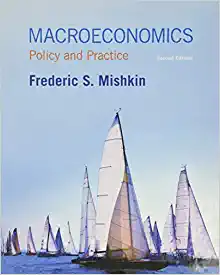Question
1-When you go shopping, you generally find all the products and services you are looking for, at prices you are willing to pay. It's actually






1-When you go shopping, you generally find all the products and services you are looking for, at prices you are willing to pay. It's actually amazing that retailers in cities as big as New York, Los Angeles, and Chicago somehow know what products to stock in their stores and in what quantities. Adam Smith, the father of modern economics, described this situation by saying that the free market economy operates as if an "invisible hand" (the price system) is directing it.
1.1-What is the process through which the free market economy determines which goods and services should be produced?
1.2-And the economies that are not free market, how do they decide which goods to produce?
2- Gross Domestic Product (GDP) If we compare the real gross domestic product, real GDP, of the United States in 1980 (6,450 billion dollars of the year 2009), with the estimated real GDP for the year 2019 (18,397 billion dollars of the year 2009) we see that the estimated figure for 2019 is 2.85 times larger than that observed in 1980.
2.1-What interpretation can we give to this phenomenon?
2.2-Is it true that, on average, families in this country would have at the end of 2019, 2.85 times more goods and services than in 1980?
2.3-Can we say that the standard of living would have practically multiplied by 2.85 during the period 1980-2019?
2.4-Is it true that economic welfare in the United States would have been multiplied by 2.85?
2.5-Will its residents be 2.85 times happier in 2019 than we were in 1980?
3-According to the information collected by the censuses, in 2013 around 14.5% of the families of the United States of North America were poor (USA Census Bureau, 2014). Suppose someone comes up with the idea of ??asking the government to make more money and distribute that new money to families living in poverty. The person who came up with the "bright idea" asks you a series of questions:
3.1-Which government institution can make more money?
3.2-How is it produced?
3.3-What impact does a higher money supply have on inflation?
3.4-Why didn't this idea occur to anyone before?
3.5-Do you agree that this is a good idea? Why or why not?
4-Before the North American Free Trade Agreement (NAFTA) was signed, there was a great discussion at all levels. Congress, the unions, the public, the President, offered their views. The Agreement finally entered into force in 1994. Free trade agreements do not affect everyone equally; that is why their signatures entail "heated" discussions; to the point that the current President of the United States, Mr. Donald Trump, proposed the renegotiation not only of NAFTA, but of all trade agreements signed, including those with the European Economic Community, and challenged China by imposing tariffs on imports of goods and services from that country. In December 2018, the United States, Mexico and Canada signed an agreement: the United States, Mexico and Canada Agreement (USMCA), which replaced NAFTA.
4.1-Is it a good idea for the United States to have signed the USMCA with Canada and Mexico?
4.2-What are some of the arguments in favor?
4.3-What are some of the arguments against?
4.4-If you had been able to participate in the vote, would you have voted for or against signing the NAFTA treaty or its replacement, the USMCA?
4.5-How will the imposition of tariffs imposed by President Trump on the importation of aluminum to the United States affect you as a consumer? Why?
References for each question;
Question1: Reference in photos






Step by Step Solution
There are 3 Steps involved in it
Step: 1

Get Instant Access to Expert-Tailored Solutions
See step-by-step solutions with expert insights and AI powered tools for academic success
Step: 2

Step: 3

Ace Your Homework with AI
Get the answers you need in no time with our AI-driven, step-by-step assistance
Get Started


